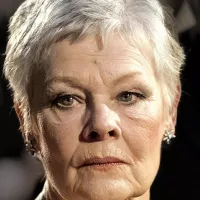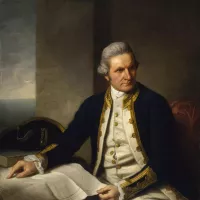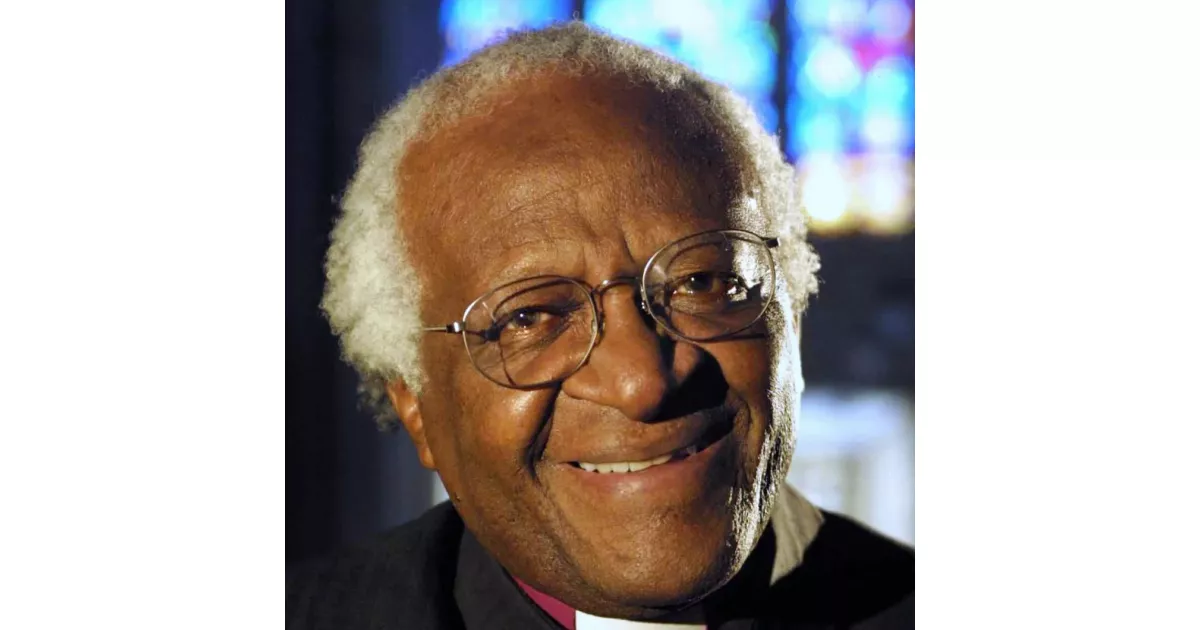Desmond Tutu was a prominent South African figure who served as the first Black African Bishop of Johannesburg and Archbishop of Cape Town. He was deeply involved in the anti-apartheid movement and a vocal advocate for human rights. His theological work focused on combining Black and African theological thought.
October 1931: Birth of Desmond Tutu
Desmond Tutu was born in October 1931 in Klerksdorp, Transvaal, South Africa.
June 1932: Baptism into the Methodist Church
Desmond Tutu was baptized into the Methodist Church in June 1932.
1936: Move to Tshing and Early Education
In 1936, Tutu's family relocated to Tshing, where he started primary school, learned Afrikaans, and began serving at St Francis Anglican Church.
1941: Move to Johannesburg and Education
Tutu's mother moved to Johannesburg in 1941 to work, and he joined her, continuing his education at a Methodist primary school and later at the Swedish Boarding School.
1945: Entering Johannesburg Bantu High School
Desmond Tutu began attending Johannesburg Bantu High School (Madibane High School) in 1945, where he excelled in his studies.
1947: Hospitalization for Tuberculosis
Desmond Tutu was diagnosed with tuberculosis in 1947 and spent 18 months recovering at Rietfontein hospital, during which he was frequently visited by Father Trevor Huddleston.
1949: Return to School after Illness
After recovering from tuberculosis, Desmond Tutu returned to school in 1949.
1950: Completion of National Exams
Desmond Tutu completed his national exams in late 1950 and obtained a second-class pass.
1951: Teacher Training at Pretoria Bantu Normal College
Due to financial constraints, Tutu pursued teacher training at Pretoria Bantu Normal College in 1951 with the help of a government scholarship, instead of pursuing medicine.
1953: Discontent with Bantu Education Act
In response to the introduction of the Bantu Education Act by the National Party government in 1953, Desmond Tutu and his wife, both educators, decided to leave the teaching profession.
1954: Teaching Career Begins
Desmond Tutu started his teaching career at Madibane High School in 1954, later moving to Krugersdorp High School the following year where he taught English and history.
June 1955: Marriage to Nomalizo Leah Shenxane
In June 1955, Desmond Tutu married Nomalizo Leah Shenxane in a legal ceremony at Krugersdorp Native Commissioner's Court, followed by a Roman Catholic wedding ceremony at the Church of Mary Queen of Apostles.
July 1955: Marriage to Nomalizo Leah Shenxane
On July 1955, Tutu married Nomalizo Leah Shenxane, a teacher he met during college. They went on to have four children together.
January 1956: Application to Ordinands Guild and Acceptance
In January 1956, Desmond Tutu's initial application to join the Ordinands Guild was rejected due to outstanding debts. After industrialist Harry Oppenheimer cleared his debts, Tutu was admitted to St Peter's Theological College in Johannesburg.
April 1956: Birth of First Child, Trevor
Desmond and Leah Tutu welcomed their first child, a son named Trevor, in April 1956.
August 1960: Birth of Daughter, Naomi
Desmond and Leah Tutu welcomed their third child, a daughter named Naomi, in August 1960.
December 1960: Ordination and Appointment as Assistant Curate
Desmond Tutu was ordained as an Anglican priest in December 1960 by Edward Paget at St Mary's Cathedral. He was subsequently appointed assistant curate at St Alban's Parish in Benoni, where he served a predominantly black congregation.
1960: Ordination as Anglican Priest
Desmond Tutu was ordained as an Anglican priest in 1960.
1960: Albert Luthuli's Nobel Peace Prize
In 1960, Albert Luthuli became the first South African to be awarded the Nobel Peace Prize. This event is significant as it marked an early instance of international recognition for the resistance against apartheid.
1960: Theological Studies and Political Climate
While Desmond Tutu pursued theological studies at St Peter's Theological College, South Africa witnessed a surge in anti-apartheid activism and government crackdown, including the Sharpeville massacre. However, Tutu and his fellow trainees remained largely uninvolved in the political turmoil.
September 1962: Move to England for Further Studies
With support from Aelfred Stubbs and funding from the International Missionary Council, Desmond Tutu and his family moved to England in September 1962, where he would pursue theological studies at King's College London.
1962: Theological Studies in London
Desmond Tutu moved to the United Kingdom in 1962 to pursue theological studies at King's College London.
1963: Birth of Daughter, Mpho Andrea, and Academic Success
While living in London for his studies at King's College, Desmond and Leah Tutu welcomed their fourth child, Mpho Andrea Tutu, in 1963. During this time, Tutu excelled in his theological studies, impressing his tutors who recommended him for an honours degree.
October 1965: Commencement of Master's Degree
Desmond Tutu started his master's degree studies in October 1965, focusing on Islam in West Africa.
September 1966: Completion of Master's Degree
Desmond Tutu completed his Master's degree in September 1966.
1966: Move to East Jerusalem for Language Studies
Desmond Tutu and his family relocated to East Jerusalem in 1966, where he spent two months studying Arabic and Greek at St George's College.
1966: Return to Southern Africa and Teaching Positions
Returning to southern Africa in 1966, Tutu took up teaching positions at the Federal Theological Seminary and later at the University of Botswana, Lesotho and Swaziland.
1967: Return to South Africa and Teaching Position at Federal Theological Seminary
Desmond Tutu and his family returned to South Africa in 1967, settling in Alice, Eastern Cape. He took up a teaching position at the newly established Federal Theological Seminary (Fedsem).
1967: Opposition to the Terrorism Act
In 1967, the South African government introduced the Terrorism Act, a piece of legislation that Tutu strongly opposed. This act, which allowed for indefinite detention without trial, was seen as a tool to silence and suppress dissent against apartheid. Tutu, alongside other activists like Winnie Mandela, actively spoke out against the act and its implications, highlighting the government's increasingly oppressive tactics.
August 1968: Sermon Comparing South Africa to Eastern Bloc
In a notable sermon delivered in August 1968, Desmond Tutu drew parallels between the situation in apartheid-era South Africa and the political climate in the Eastern Bloc, likening anti-apartheid demonstrations to the recent Prague Spring uprising.
January 1970: Teaching Position at the University of Botswana, Lesotho and Swaziland
In January 1970, Desmond Tutu accepted a teaching position at the University of Botswana, Lesotho and Swaziland (UBLS) in Roma, Lesotho, a move prompted by a better salary and proximity to his children.
February 1971: Death of Desmond Tutu's Father
Desmond Tutu's father passed away in February 1971.
March 1972: Relocation to England and Appointment at TEF
In March 1972, facing government scrutiny in South Africa, Tutu relocated to England to take on the role of director for Africa at the Theological Education Fund (TEF). This move came after initial resistance from the South African government, suspicious of Tutu's activism. He settled with his family in Grove Park, near Bromley, where TEF's headquarters were located, and also served as the honorary curate of St Augustine's Church.
1972: Theological Education Fund Director for Africa
In 1972, Desmond Tutu assumed the role of Director for Africa at the Theological Education Fund, a position based in London that required frequent trips across the African continent.
1972: Experiences and Observations During African Tours for TEF
Throughout 1972, Tutu's work with the Theological Education Fund (TEF) involved traveling across Africa to assess grants for theological institutions. These experiences exposed him to the realities of poverty and corruption, particularly in Zaire, where he was critical of Mobutu Sese Seko's regime. In Nigeria, he observed the tension following the Biafran conflict. His visit to East Africa included interactions with Jomo Kenyatta's government in Kenya and witnessing the expulsion of Ugandan Asians under Idi Amin's rule. These experiences significantly impacted Tutu's theological perspectives.
1973: Conference Paper at Union Theological Seminary
In 1973, Desmond Tutu presented a conference paper at the Union Theological Seminary.
1973: Exploration of Black Theology and its Impact
In 1973, Tutu's theology underwent a transformation influenced by his African experiences and exposure to liberation theology. He was drawn to black theology, attending a conference on the subject at Union Theological Seminary in New York City. He presented a paper emphasizing that black theology was rooted in real-life struggles and not merely an academic pursuit. He argued for its validity independent of white approval, seeking to merge African American and African theological thought, contrasting with some African theologians who considered it a foreign concept.
March 1975: Appointment as Dean of St Mary's Cathedral, Johannesburg
In March 1975, after missing out on the Bishop of Johannesburg position, Tutu was elected dean of St Mary's Cathedral in Johannesburg at the suggestion of the new bishop, Timothy Bavin. This made him the first black person to hold this position, the fourth highest in the Anglican Church of Southern Africa, and garnered significant attention in South Africa.
August 1975: Installation as Dean and Early Experiences
Tutu's official installation as dean took place in August 1975 at a packed St Mary's Cathedral. Notably, he chose to live in Soweto, a predominantly black township, rather than the designated dean's residence in the white suburb of Houghton. He encountered hope for a desegregated South Africa in the racially diverse congregation but also faced pushback for his attempts to modernize liturgies, including introducing gender-neutral language.
1975: Return to South Africa and Church Leadership Roles
Desmond Tutu returned to southern Africa in 1975 and served as the Dean of St Mary's Cathedral in Johannesburg before becoming the Bishop of Lesotho.
March 1976: Election and Reluctant Acceptance of Lesotho Bishopric
Despite his reservations, Tutu was elected Bishop of Lesotho in March 1976 after initially being nominated for the position. While this was an advancement in the church hierarchy, the decision sparked discontent among his Johannesburg congregation, who perceived it as using their parish for career progression.
May 1976: Public Stance Against Apartheid and Warning to Vorster
Using his platform as dean, Tutu became increasingly vocal against apartheid, advocating for an international economic boycott of South Africa. He engaged with Black Consciousness leaders and collaborated with anti-apartheid figures like Winnie Mandela to oppose the government's Terrorism Act of 1967. In May 1976, he wrote a letter to Prime Minister B.J. Vorster cautioning that the government's adherence to apartheid would result in widespread racial violence.
September 1977: Return to South Africa and Speech at Steve Biko's Funeral
In September 1977, Tutu returned to South Africa to deliver a powerful speech at the funeral of Steve Biko, a prominent Black Consciousness activist killed in police custody. He described the Black Consciousness movement as a divine call for black people to recognize their inherent worth and dignity. This act further solidified Tutu's image as a leading voice against apartheid and a champion for social justice.
March 1978: Assumption of Leadership at the South African Council of Churches
In March 1978, Tutu took on the demanding role of general secretary of the South African Council of Churches (SACC), returning to Johannesburg after his time in Lesotho. His acceptance came after the initial appointee stepped down, and while it marked a significant leadership position within the church, it also drew criticism from those who felt abandoned by his departure from Lesotho.
1978: General-Secretary of the South African Council of Churches
In 1978, Desmond Tutu became the General-Secretary of the South African Council of Churches, a position he held until 1985.
October 1979: Reprimanded for Supporting Boycott
In October 1979, Desmond Tutu faced reprimand from government ministers for publicly supporting an international economic boycott of South Africa. This event highlighted his growing international profile and the risks he was taking in opposing apartheid.
March 1980: Passport Confiscated, Raising International Profile
In March 1980, the South African government confiscated Desmond Tutu's passport as a result of his activism against apartheid. This action, while meant to limit his influence, actually served to further raise his international profile.
January 1981: Passport Returned, International Tour
Desmond Tutu's passport was returned to him in January 1981. He then embarked on a five-week tour of Europe and North America, meeting with key figures like UN Secretary-General Kurt Waldheim and Pope John Paul II, further solidifying his international influence.
1981: First Nobel Peace Prize Nomination
Desmond Tutu received his first nomination for the Nobel Peace Prize in 1981, marking the beginning of international recognition for his work against apartheid.
1981: Testimony at the Eloff Commission and Criticism of the Report
During a 1981 government commission, led by Judge C.F. Eloff, investigating financial irregularities within the SACC, Tutu delivered a powerful testimony denouncing apartheid as inherently evil and unchristian. He later criticized the commission's findings, particularly the lack of theological representation, drawing a parallel to "blind men" judging a flower show. This episode underscored Tutu's unwavering stance against apartheid, even when facing government scrutiny.
September 1982: Addressing the Episcopal Church and Visiting Family
In September 1982, Tutu addressed the Triennial Convention of the Episcopal Church in New Orleans. During this trip, he also visited his daughter Naomi in Kentucky. This visit highlights his growing influence within the Church and his commitment to family.
1982: Second Nobel Peace Prize Nomination
Desmond Tutu received his second Nobel Peace Prize nomination in 1982, further highlighting the growing recognition of his work against apartheid.
August 1983: Becoming Patron of the United Democratic Front
Desmond Tutu became a patron of the United Democratic Front (UDF), a new anti-apartheid organization, in August 1983. This move solidified his position as a leading figure in the fight against apartheid.
1983: Third Nobel Peace Prize Nomination
Desmond Tutu was nominated for the Nobel Peace Prize for the third consecutive year in 1983, indicating the continued international attention on his activism against apartheid.
October 1984: Nobel Peace Prize
Desmond Tutu was awarded the Nobel Peace Prize on October 16, 1984, for his unwavering and courageous leadership in the fight against apartheid in South Africa. The Nobel Committee acknowledged his efforts in uniting people across racial divides and his commitment to non-violent resistance.
October 1984: Elected Bishop of Johannesburg
In October 1984, despite opposition from the white laity, Desmond Tutu was elected as the Bishop of Johannesburg. This historic election made him the first black person to hold the position.
1984: Polarizing Figure in South Africa
By 1984, Desmond Tutu had become a deeply polarizing figure in South Africa. He was widely revered by Black South Africans as a symbol of achievement and a leader in the anti-apartheid movement. However, he faced sharp criticism from many white South Africans and even some within the anti-apartheid movement who found his approach too moderate.
1984: Winning the Nobel Peace Prize
Desmond Tutu was awarded the Nobel Peace Prize in 1984. This prestigious award recognized his non-violent resistance to apartheid and further elevated his international stature.
1984: Sabbatical, Nobel Prize Nomination, and Criticism of Reagan Administration
During his sabbatical in 1984, Tutu was nominated for the Nobel Peace Prize for the fourth consecutive year. He also criticized the Reagan administration for its stance on apartheid.
1984: Target of Apartheid Government
In 1984, Desmond Tutu was a primary target of the apartheid government's smear campaign. He was often misquoted and portrayed negatively in state-controlled media to discredit him and undermine his message against apartheid. Despite facing intense opposition and hatred from supporters of apartheid, Tutu remained a steadfast critic, advocating for sanctions against the regime and highlighting the looming threat of racial violence.
1984: Criticism from Anti-Apartheid Movement and Communists
In 1984, Tutu faced criticism from some within the anti-apartheid movement who viewed his focus on reconciliation and dialogue with white South Africans as being too accommodating. Additionally, his criticism of Marxist-oriented communism drew sharp rebuke from the South African Communist Party.
1984: Publication of "Hope and Suffering"
In 1984, Tutu published "Hope and Suffering," a compilation of his sermons and speeches that served as a testament to his ongoing commitment to justice and equality in South Africa. The book provided insights into his theological perspectives and his experiences navigating the complexities of apartheid, offering a message of resilience and the possibility of a more just future.
January 1985: Condemnation of Violence and Disagreement with AZAPO
During Ted Kennedy's visit to South Africa in January 1985, Desmond Tutu condemned the violence and killing of suspected collaborators. He also publicly disagreed with the Azanian People's Organisation (AZAPO) for disrupting Kennedy's visit.
February 1985: Enthronement as Bishop of Johannesburg
Desmond Tutu was officially enthroned as the sixth Bishop of Johannesburg in February 1985. This event marked a pivotal moment in the South African church and further strengthened Tutu's platform against apartheid.
April 1985: Protest Against Geoff Moselane's Arrest
Desmond Tutu led a march of clergy in April 1985 to protest the arrest of Geoff Moselane, demonstrating his continued resistance against apartheid even amidst growing tensions.
May 1985: International Advocacy Against Apartheid
In May 1985, Desmond Tutu embarked on a speaking tour across the United States to advocate against apartheid in South Africa.
July 1985: State of Emergency and Tutu's Peace Efforts
In July 1985, South Africa declared a state of emergency amid growing unrest. Despite the government's actions, Tutu continued advocating for peace, offering to mediate between the government and black organizations.
October 1985: Address to the United Nations
During October 1985, Tutu addressed the political committee of the United Nations General Assembly, urging for international sanctions against South Africa if apartheid wasn't dismantled within six months.
October 1985: Supporting National Strike and Reconciliation Efforts
In October 1985, Tutu supported the National Initiative for Reconciliation's call for a day of prayer and fasting. He also proposed a national strike against apartheid, a move that sparked debate.
1985: Bishop of Johannesburg
Desmond Tutu became the Bishop of Johannesburg in 1985, the first Black African to hold the position.
1985: Honorary Citizen of Reggio Emilia
In 1985, the city of Reggio Emilia bestowed upon Tutu honorary citizenship, alongside fellow anti-apartheid activist Albertina Sisulu, acknowledging their global impact.
1985: No Specific Event Provided
No specific event was described for this entry. The text only provides a year.
1985: Opposition to Marxism-Leninism
Tutu voiced strong opposition to Marxism-Leninism in 1985, despite understanding why some Black South Africans turned to it, drawing parallels between the treatment of people under such regimes and the treatment of South Africans under apartheid.
February 1986: Appointment as Archbishop of Cape Town
The Black Solidarity Group campaigned for Tutu's appointment as Archbishop of Cape Town in February 1986. He secured the necessary votes and became the first black person to hold the position.
May 1986: Return to the US and Advocacy Tours
Tutu returned to the United States in May 1986 to continue his advocacy against apartheid.
August 1986: Global Advocacy for Sanctions
August 1986 marked Tutu's visits to Japan, China, and Jamaica to promote sanctions against South Africa.
September 1986: Enthronement and Open-Air Eucharist
In September 1986, Tutu's enthronement ceremony as Archbishop took place, followed by an open-air Eucharist attended by thousands.
1986: Ubuntu Definition
In 1986, Desmond Tutu defined Ubuntu as "gentleness, compassion, hospitality, openness to others, vulnerability, availability to others, and knowing that you are bound up with them in the bundle of life."
1986: Archbishop of Cape Town
In 1986, Desmond Tutu was appointed as the Archbishop of Cape Town, becoming the first Black African to hold this senior position in southern Africa's Anglican hierarchy.
1986: Tutu's Socialist Views
In 1986, Tutu publicly identified as a socialist, expressing concerns about the negative aspects of capitalism.
1987: Championing the Oppressed at the All Africa Conference of Churches
In 1987, Desmond Tutu delivered a powerful keynote speech at the All Africa Conference of Churches, challenging churches to support the oppressed across Africa. He expressed his disappointment at the decline of freedom and personal liberty in many African nations compared to the colonial period. He was elected president of the AACC, working closely with general-secretary José Belo.
1987: Pacem in Terris Award
Tutu was honored with the Pacem in Terris Award in 1987. Named after a 1963 encyclical by Pope John XXIII, the award recognized his dedication to peace and reconciliation in a deeply divided South Africa.
1987: Mediation and Advocacy During Ashley Kriel's Funeral
Tutu, Boesak, and Naidoo mediated conflicts between protesters and security forces, notably during the 1987 funeral of Ashley Kriel.
February 1988: Formation of the Committee for the Defense of Democracy
Following the government's ban on several organizations, church leaders, including Tutu, established the Committee for the Defense of Democracy in February 1988.
March 1988: Advocacy for the Sharpeville Six
In March 1988, Tutu took up the cause of the Sharpeville Six, sentenced to death, appealing to international governments and personally meeting with President Botha to advocate for their sentences to be commuted.
May 1988: Government's Covert Campaign Against Tutu
The South African government launched a covert campaign against Tutu in May 1988, involving the spread of propaganda and harassment of those close to him.
1988: "A Voice for the Voiceless"
By 1988, Tutu was widely recognized as "a spokesman for his people, a voice for the voiceless," giving voice to the struggles and aspirations of Black South Africans against apartheid.
1988: Tutu's Address to the Government
Desmond Tutu addressed the South African government in 1988, challenging their policies and advocating for change.
1988: First Honorary Doctorate from a Canadian University
In 1988, Mount Allison University in New Brunswick, Canada, made history by awarding Tutu an honorary doctorate, marking the first such recognition from a Canadian institution.
1988: Advocating for Peace in Northern Ireland
In 1988, during the Lambeth Conference, Desmond Tutu supported a resolution denouncing violence from all sides in the Northern Ireland conflict. He believed that Irish republicans should prioritize peaceful solutions over armed struggle.
August 1989: Continued Civil Disobedience and Advocacy
Tutu participated in acts of civil disobedience, including organizing services and marches against segregation, in August 1989.
1989: Coining the Metaphor of the "Rainbow People of God"
Desmond Tutu first used the metaphor "rainbow people of God" in 1989 to describe a multi-racial protest group, highlighting the power of unity and diversity in the struggle against apartheid.
1989: Navigating the Israeli-Palestinian Conflict
In 1989, Desmond Tutu became involved in the Israeli-Palestinian conflict, drawing parallels between Israel's treatment of Palestinians and South African apartheid. He criticized Israel's arms sales to South Africa and its actions in the Sabra and Shatila massacre while acknowledging Israel's right to exist. Tutu advocated for a two-state solution and urged Yasser Arafat to recognize Israel. His visit to the Yad Vashem Holocaust memorial and calls for forgiveness sparked controversy within Jewish communities.
1989: Leadership and Advocacy within the Anglican Church
In 1989, Tutu championed the ordination of female priests and the appointment of gay priests to senior positions within the Anglican church.
February 1990: Support for Political Change and Mandela's Release
Following the unbanning of political parties and Nelson Mandela's release in February 1990, Tutu hosted Mandela and called for an end to foreign sanctions.
November 1990: Bishopscourt Summit for Peace
In November 1990, Tutu organized a summit at Bishopscourt, urging black political leaders to promote peace and free political campaigning.
1990: Reunion with Nelson Mandela
After their first brief encounter during a debating event in the 1950s, Desmond Tutu and Nelson Mandela wouldn't cross paths again until 1990.
1990: Release of Nelson Mandela and Mediation Efforts
Following the release of Nelson Mandela from prison in 1990, Desmond Tutu played a crucial role as a mediator between different black factions to end apartheid and establish a multi-racial democracy in South Africa.
April 1994: Exuberance at South Africa's Transformative Elections
In April 1994, Desmond Tutu was filled with joy at the prospect of South Africa transitioning to universal suffrage through peaceful negotiations. He actively encouraged people to vote, and when the ANC won the election, he expressed his elation, describing the feeling as being "on cloud nine". Tutu played a significant role in planning Mandela's inauguration ceremony, emphasizing the inclusion of diverse religious leaders.
October 1994: Announcing Retirement as Archbishop
In October 1994, Desmond Tutu announced his decision to retire as Archbishop in 1996. Recognizing his immense contributions, the other bishops bestowed upon him the new title of "Archbishop Emeritus", a unique honor.
1994: Publication of "The Rainbow People of God"
"The Rainbow People of God," a collection of Tutu's writings, was published in 1994.
1994: Chair of the Truth and Reconciliation Commission
After the multi-racial elections in 1994, which brought Nelson Mandela's government to power, Tutu was chosen to lead the Truth and Reconciliation Commission. This commission investigated past human rights violations committed by both supporters and opponents of apartheid.
1994: Championing the "Rainbow Nation" and Critical Solidarity
Following the establishment of the ANC government in 1994, Desmond Tutu actively promoted the idea of a "Rainbow Nation", symbolizing a harmonious and inclusive South Africa. He advocated for "critical solidarity", supporting pro-democracy movements while maintaining the right to critique their actions.
1994: Promoting Peace in War-Torn Liberia
In 1994, Desmond Tutu, accompanied by José Belo, traveled to war-torn Liberia. They aimed to encourage peace and met with Charles Taylor, a key figure in the conflict, but Tutu expressed reservations about Taylor's commitment to a ceasefire.
July 1995: Establishment of the Truth and Reconciliation Commission
In July 1995, South Africa's parliament passed legislation to establish the Truth and Reconciliation Commission (TRC), a groundbreaking initiative to address the legacy of apartheid-era human rights abuses. The TRC aimed to promote healing and reconciliation by uncovering the truth about past atrocities, granting amnesty to perpetrators who confessed, and providing support to victims.
July 1995: Advocating for Peace and Justice in Rwanda
In July 1995, a year after the Rwandan genocide, Desmond Tutu traveled to Kigali, where he preached to a crowd of 10,000 people. He urged for justice to be pursued alongside mercy for the Hutus who orchestrated the genocide.
April 1996: First hearings of the Truth and Reconciliation Commission (TRC)
In April 1996, the first hearings of the Truth and Reconciliation Commission (TRC), chaired by Desmond Tutu, began. These hearings, which aimed to address human rights abuses from both sides of the apartheid struggle, were publicly televised and significantly impacted South African society.
June 1996: Farewell Ceremony and National Honor
A grand farewell ceremony was held at St. George's Cathedral in June 1996 to mark Desmond Tutu's retirement as Archbishop. The event was graced by prominent figures like Nelson Mandela and F.W. de Klerk. During the ceremony, Mandela awarded Tutu the Order for Meritorious Service, South Africa's highest honor, in recognition of his extraordinary contributions to the nation. Njongonkulu Ndungane succeeded Tutu as Archbishop.
1996: End of Term as Archbishop of Cape Town
Desmond Tutu's term as the Archbishop of Cape Town concluded in 1996.
January 1997: Battling Prostate Cancer and Raising Awareness
In January 1997, Desmond Tutu was diagnosed with prostate cancer. He chose to make his diagnosis public to encourage other men to undergo prostate exams, demonstrating his commitment to public health even while battling a serious illness.
October 1998: Presentation of the TRC report
In October 1998, Desmond Tutu presented the five-volume TRC report to Nelson Mandela in Pretoria. Despite recognizing its limitations, Tutu expressed satisfaction with the TRC's work, believing it would foster long-term reconciliation in South Africa.
1998: Promoting Dialogue in Belfast
Continuing his efforts for peace in Northern Ireland, Desmond Tutu visited Belfast in 1998 to encourage dialogue and reconciliation between the conflicting factions.
1998: Lambeth Conference and Tutu's stance on LGBTQ+ rights
Following the 1998 Lambeth Conference of bishops, which reaffirmed the Anglican Church's opposition to same-sex sexual acts, Desmond Tutu expressed his shame at being an Anglican. He strongly criticized the church's stance, drawing parallels between discrimination against homosexuals and discrimination against black people and women.
1998: Visiting Professorship at Emory University and Publication of "No Future Without Forgiveness"
From 1998 to 2000, Desmond Tutu took up a visiting professorship at Emory University in Atlanta, Georgia. During this time, he wrote his book "No Future Without Forgiveness", reflecting on his experiences with the Truth and Reconciliation Commission.
1999: Facing Prostate Cancer Recurrence
In 1999, Desmond Tutu experienced a recurrence of prostate cancer, demonstrating the ongoing health challenges he faced.
June 2000: Launch of the Desmond Tutu Peace Centre
June 2000 marked the launch of the Desmond Tutu Peace Centre in Cape Town, further solidifying his commitment to peacebuilding and conflict resolution.
2000: Completion of Visiting Professorship at Emory University
Desmond Tutu completed his two-year visiting professorship at Emory University in 2000.
2000: Frustration with the collapse of the Camp David Summit
Following the collapse of the 2000 Camp David Summit, Desmond Tutu expressed increasing frustration with the lack of progress in the Israeli-Palestinian conflict.
2000: Munsieville Library Renamed
In 2000, the Munsieville Library in Klerksdorp was renamed the Desmond Tutu Library, further cementing his legacy within South Africa.
2000: Common Wealth Award of Distinguished Service
Tutu received the Common Wealth Award of Distinguished Service in 2000, highlighting his exceptional contributions to society and his ongoing commitment to social justice.
2001: Continuing Peace Efforts in Belfast
Desmond Tutu made another visit to Belfast in 2001, demonstrating his sustained commitment to peace and reconciliation in Northern Ireland.
2002: Tutu criticizes Israeli policy and calls for sanctions
In 2002, Tutu delivered a widely publicized speech denouncing Israeli policy towards the Palestinians. Drawing comparisons with South Africa's apartheid, he called for sanctions against Israel, urging for stronger leadership to achieve peace.
2002: Teaching at the Episcopal Divinity School
In early 2002, Desmond Tutu shared his knowledge and experiences by teaching at the Episcopal Divinity School in Cambridge, Massachusetts, further contributing to theological education and discourse.
2002: Desmond Tutu School of Theology Launched
The establishment of the Desmond Tutu School of Theology at Fort Hare University in 2002 solidified his influence on theological education and social justice advocacy.
May 2003: Teaching at the University of North Carolina
Desmond Tutu continued his academic pursuits by teaching at the University of North Carolina from January to May 2003, sharing his experiences and insights on post-conflict societies.
June 2003: Tutu highlights the urgency of combating HIV/AIDS
In June 2003, Desmond Tutu drew a parallel between apartheid and the HIV/AIDS pandemic, emphasizing the urgent need to address the latter. He warned that inaction against HIV/AIDS could have devastating consequences for the population.
2003: Numerous Honorary Degrees and Recognitions
By 2003, Tutu had received around 100 honorary degrees from universities worldwide, demonstrating his global recognition as a leading moral voice.
2003: Golden Plate Award
In 2003, the Academy of Achievement honored Tutu with the Golden Plate Award, recognizing his impactful leadership and contributions to humanity.
2003: Empowering Future Leaders Through the Emerging Leadership Program
In 2003, the Desmond Tutu Peace Centre launched the Emerging Leadership Program, aiming to nurture and empower future leaders in peacebuilding and conflict resolution.
2003: Tutu protests against the Iraq War
In a rare move for Tutu, he participated in a New York City protest against the planned US-led invasion of Iraq in February 2003. He also urged Condoleezza Rice to prevent the war without a UN Security Council resolution, questioning the singling out of Iraq for possessing weapons of mass destruction.
January 2004: Visiting Professor at King's College London
In January 2004, Desmond Tutu returned to his alma mater, King's College London, as a visiting professor of post-conflict societies, contributing to academia and shaping future generations' understanding of peacebuilding.
2004: Tutu praises South Africa's progress but raises concerns
During his inaugural lecture at the Church of Christ the King in 2004, Tutu commended South Africa's achievements but highlighted concerns about wealth disparity, government spending on armaments, the handling of Zimbabwe's political crisis, and the dominance of Nguni-speakers in senior positions, fearing it could incite ethnic tensions.
2004: Tutu participates in an Off-Broadway play criticizing Guantanamo Bay detentions
Tutu appeared in "Honor Bound to Defend Freedom," an Off-Broadway play in 2004, criticizing the US detention of prisoners at Guantanamo Bay. This further demonstrated his stance against human rights violations, regardless of where they occurred.
January 2005: Tutu criticizes detentions without trial at Guantanamo Bay
In January 2005, Tutu joined the growing criticism against the indefinite detention of terrorist suspects without trial at Guantanamo Bay. He deemed these detentions "utterly unacceptable," likening them to the apartheid-era detentions in South Africa. He also criticized similar measures in the UK.
April 2005: Tutu criticizes Pope Benedict XVI's conservative stance
In April 2005, upon the election of Pope Benedict XVI, known for his conservative views, Tutu expressed disappointment. He criticized the Roman Catholic Church's stance against condom use amidst the HIV/AIDS crisis and its opposition to women priests.
2005: Advocacy at the 31st G8 Summit
Prior to the 31st G8 summit in 2005, Tutu called on world leaders to promote free trade with developing nations and eliminate taxes on anti-AIDS drugs.
November 2006: Tutu appointed to head a UN fact-finding mission in Gaza
Following an incident in November 2006 where Israeli soldiers killed 19 civilians in Beit Hanoun, Gaza, Tutu was appointed to lead a UN fact-finding mission. However, he canceled the trip due to Israel's refusal to grant him necessary travel clearance, amidst concerns about potential bias against Israel.
2006: Second Recurrence of Prostate Cancer
Desmond Tutu faced a second recurrence of prostate cancer in 2006, highlighting the persistent nature of his illness.
2006: Tutu launches a global campaign against child trafficking
Desmond Tutu, in 2006, launched a global campaign in partnership with the aid organization Plan. This campaign aimed to ensure that all children are registered at birth, a crucial step in combating child trafficking.
2006: Criticism of Mbeki and Zuma
Following the end of apartheid, Tutu continued to voice his opinions on the new political landscape. His criticisms of Presidents Mbeki and Zuma in 2006, particularly regarding corruption and governance, sparked controversy and pushback from their supporters.
2006: Tutu criticizes Jacob Zuma's "moral failings"
In 2006, Desmond Tutu criticized Jacob Zuma's "moral failings" in light of rape and corruption allegations against him. This highlighted Tutu's commitment to ethical leadership and his willingness to speak out against perceived injustices, even within the ANC.
June 2007: Nobel Prize Medal Stolen and Recovered
Tutu's Nobel Prize medal was stolen from his Johannesburg home in June 2007 but was recovered a week later.
July 2007: Chair of The Elders
In July 2007, Desmond Tutu was appointed Chair of The Elders, a group committed to addressing global issues.
October 2007: The Elders' Visit to Sudan
Tutu led The Elders on their first mission to Sudan in October 2007 to promote peace during the Darfur crisis.
2007: Tutu criticizes the Church's stance on homosexuality
In 2007, Desmond Tutu publicly criticized the Anglican Church's obsession with homosexuality. He stated that he wouldn't worship a homophobic God, further solidifying his position as a staunch advocate for LGBTQ+ rights.
2007: Tutu criticizes South Africa's "quiet diplomacy" towards Zimbabwe
Tutu criticized South Africa's policy of "quiet diplomacy" toward Robert Mugabe's government in Zimbabwe in 2007. He urged for a more proactive approach, calling for the Southern Africa Development Community to mediate talks between ZANU-PF and the opposition, setting deadlines and consequences for inaction.
2008: Desmond Tutu Day in Illinois
In 2008, Governor Rod Blagojevich of Illinois declared May 13th as 'Desmond Tutu Day,' marking a unique tribute to his global influence and legacy.
2008: Tutu calls for UN Peacekeeping force in Zimbabwe
In 2008, as the situation in Zimbabwe deteriorated, Desmond Tutu escalated his calls for intervention, urging the deployment of a UN Peacekeeping force to address the humanitarian and political crisis.
2008: Pro-Tibet Demonstration and Olympics Boycott Call
Tutu participated in a pro-Tibet protest in San Francisco in 2008 during the Tibetan unrest. He urged world leaders to boycott the Beijing Olympics opening ceremony in support of Tibet.
March 4, 2009: Appearance on The Late Late Show with Craig Ferguson
Tutu appeared on The Late Late Show with Craig Ferguson on March 4, 2009, in an episode that later won a Peabody Award.
October 2010: Retirement from Public Life
Tutu announced his retirement from public life in October 2010 to dedicate more time to family and personal pursuits.
2010: Retirement from Public Life
Desmond Tutu retired from public life in 2010.
2010: Bynum Tudor Lecture and Visiting Fellowship
In 2010, Tutu delivered the prestigious Bynum Tudor Lecture at the University of Oxford and subsequently became a visiting fellow at Kellogg College, Oxford, further strengthening his ties with academia and intellectual circles.
October 2011: Dalai Lama Not Granted Entry to Tutu's Birthday
Tutu invited the Dalai Lama to his 80th birthday in October 2011, but the South African government, likely to avoid upsetting China, did not grant the Dalai Lama entry.
2011: Call for Same-Sex Marriage Recognition
In 2011, Tutu urged the Anglican Church of Southern Africa to endorse same-sex marriage.
November 2012: Support for Chelsea Manning
In November 2012, Tutu published a letter expressing his support for Chelsea Manning, a US military whistleblower who was imprisoned.
2012: Tutu calls for the trial of George W. Bush and Tony Blair
In 2012, Desmond Tutu called for the International Criminal Court to try former US President George W. Bush and former British Prime Minister Tony Blair for their role in initiating the Iraq War.
May 2013: Stepping Down as Chair of The Elders
Tutu stepped down as Chair of The Elders in May 2013 and became an Honorary Elder. He expressed his belief that presidents should not hold office for life.
2013: Templeton Prize
Desmond Tutu received the prestigious Templeton Prize in 2013, with a value of £1.1 million (US$1.6 million), for his life's work dedicated to promoting spiritual principles such as love, forgiveness, and reconciliation.
2013: Criticism of the ANC and Support for a New Party
In 2013, Tutu stated he would no longer vote for the ANC, citing concerns about inequality, violence, and corruption. He welcomed the formation of a new party, Agang South Africa.
May 2014: Criticism of Oil Extraction in Canada
During a visit to Canada's oil sands in May 2014, Tutu condemned the environmental impact of oil extraction, criticizing what he perceived as "negligence and greed."
2014: Support for Legalized Assisted Dying
Tutu expressed his support for legalized assisted dying in 2014, stating his desire for the option to be available to him.
2015: Honorary Member of the Order of the Companions of Honour
Queen Elizabeth II appointed Desmond Tutu as an Honorary Member of the Order of the Companions of Honour (CH) in 2015, signifying high recognition for his outstanding achievements and service.
2015: Blessing of Daughter's Same-Sex Marriage
Tutu gave his blessing at his daughter Mpho's same-sex marriage in the Netherlands in 2015.
August 2017: Plea to Saudi Arabia Regarding Executions
Tutu joined other Nobel Peace Prize laureates in August 2017 to urge Saudi Arabia to halt the planned executions of individuals involved in the 2011-2012 Saudi Arabian protests.
September 2017: Bailiff Grand Cross of the Venerable Order of St. John
Queen Elizabeth II appointed Tutu as a Bailiff Grand Cross of the Venerable Order of St. John in September 2017, marking another significant honor from the British monarchy.
December 2017: Condemnation of Trump's Jerusalem Decision
Tutu was among those who condemned US President Donald Trump's decision to formally recognize Jerusalem as Israel's capital in December 2017.
2018: Fossil Named After Tutu
In 2018, a remarkable tribute to Tutu came in the form of a newly discovered fossil. A Devonian tetrapod fossil, unearthed in Grahamstown by Rob Gess of the Albany Museum, was named Tutusius umlambo in honor of the Archbishop.
December 2020: Call for Action on Israel's Nuclear Weapons
In his final public statement on global affairs, published in December 2020, Tutu urged incoming US President Joe Biden to acknowledge Israel's nuclear capabilities and cease financial aid, believing it would lead to the end of Israel's "apartheid" system and foster peace.
December 2021: Death of Desmond Tutu
Desmond Tutu passed away from cancer at the age of 90 in December 2021 in Cape Town, South Africa.
January 2022: Funeral of Desmond Tutu
Desmond Tutu's funeral took place in January 2022 at St. George's Cathedral in Cape Town. His body was laid in state for two days prior, and national landmarks were illuminated in purple to honor him.
Mentioned in this timeline

Donald John Trump is an American politician media personality and...

Elizabeth II reigned as Queen of the United Kingdom and...

George W Bush the rd U S President - is...

Joe Biden is an American politician who served as the...
Nigeria is a West African nation the most populous in...
Saudi Arabia officially the Kingdom of Saudi Arabia KSA is...
Trending

30 minutes ago Rosamund Pike recalls Judi Dench's 'naughty' side, calling her a 'mischief maker'.

2 hours ago Declan Rice's behavior scrutinized after derby win; Scholes deems him too emotional.

2 hours ago Donovan Clingan shines for Trail Blazers: Draft prospect improves shooting and raises questions.

31 minutes ago James Cook and Dion Dawkins to appear at Dick’s House of Sport opening.

2 hours ago Shakira's Mexico City Concert: Security, Tickets, and Traffic Updates

2 hours ago Courteney Cox wears 90s jeans, stays overnight with on-screen husband Greg Kinnear.
Popular

Jesse Jackson is an American civil rights activist politician and...

Susan Rice is an American diplomat and public official prominent...

Barack Obama the th U S President - was the...

Michael Joseph Jackson the King of Pop was a highly...

XXXTentacion born Jahseh Dwayne Ricardo Onfroy was a controversial yet...

Bernie Sanders is a prominent American politician currently serving as...
